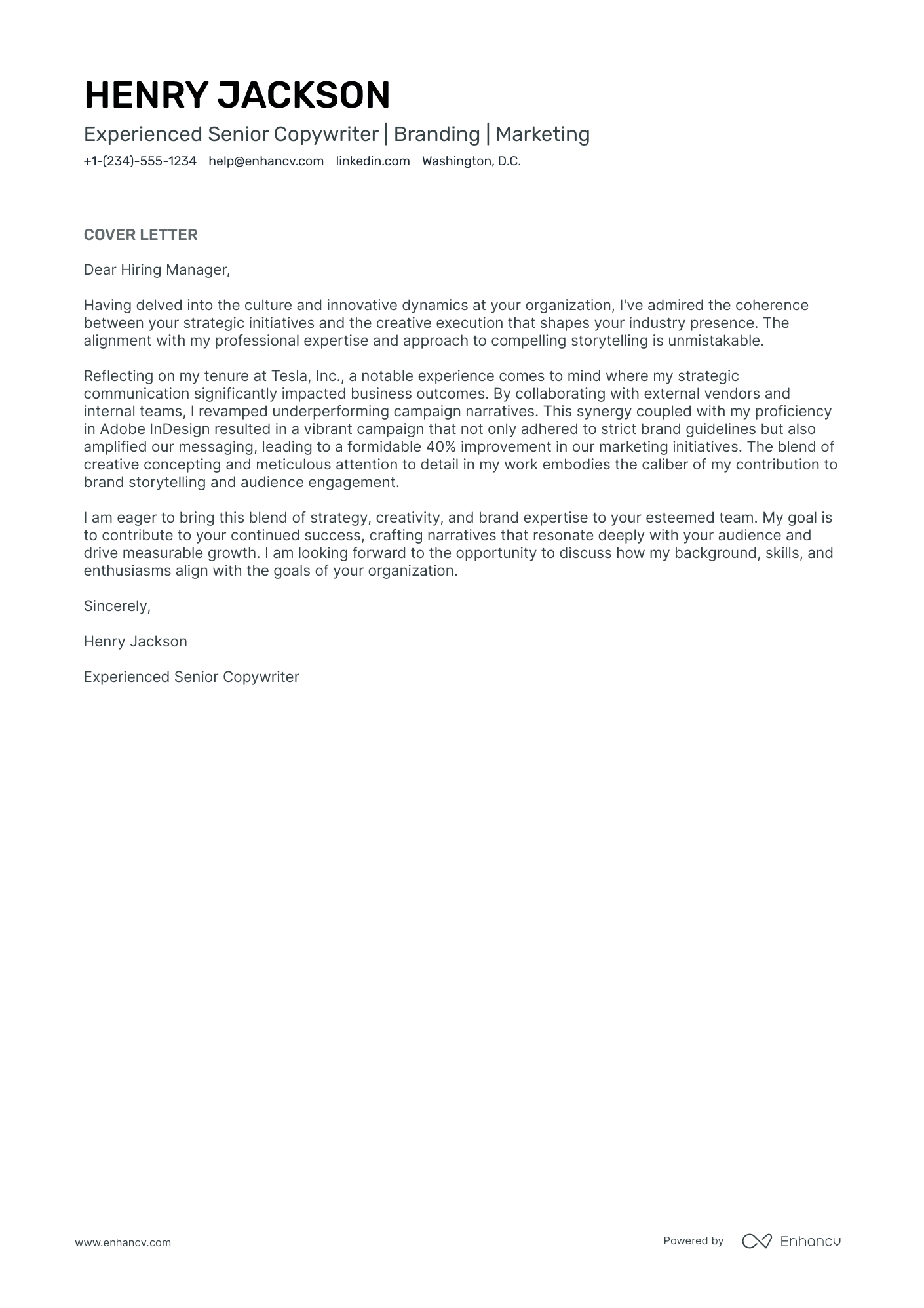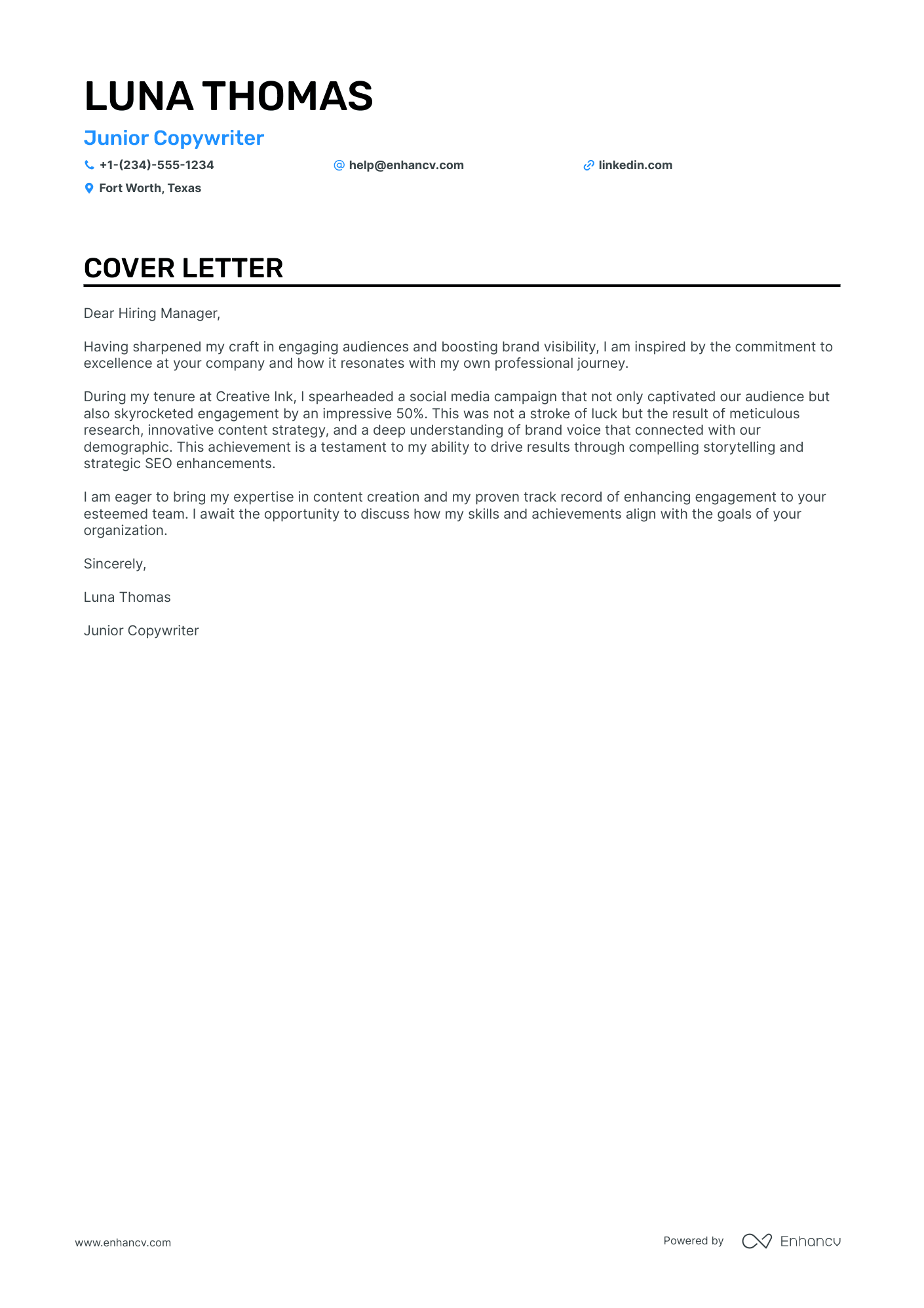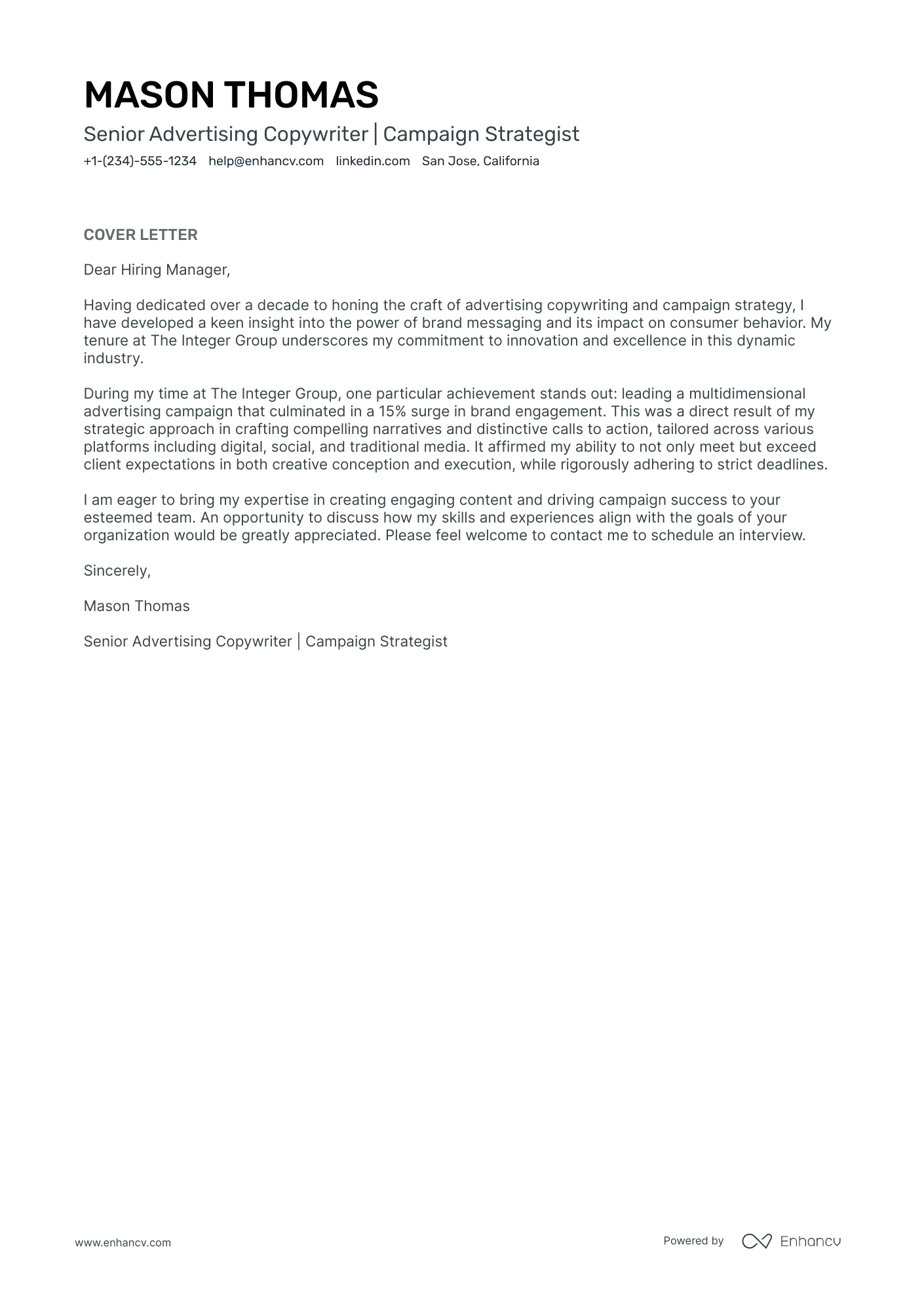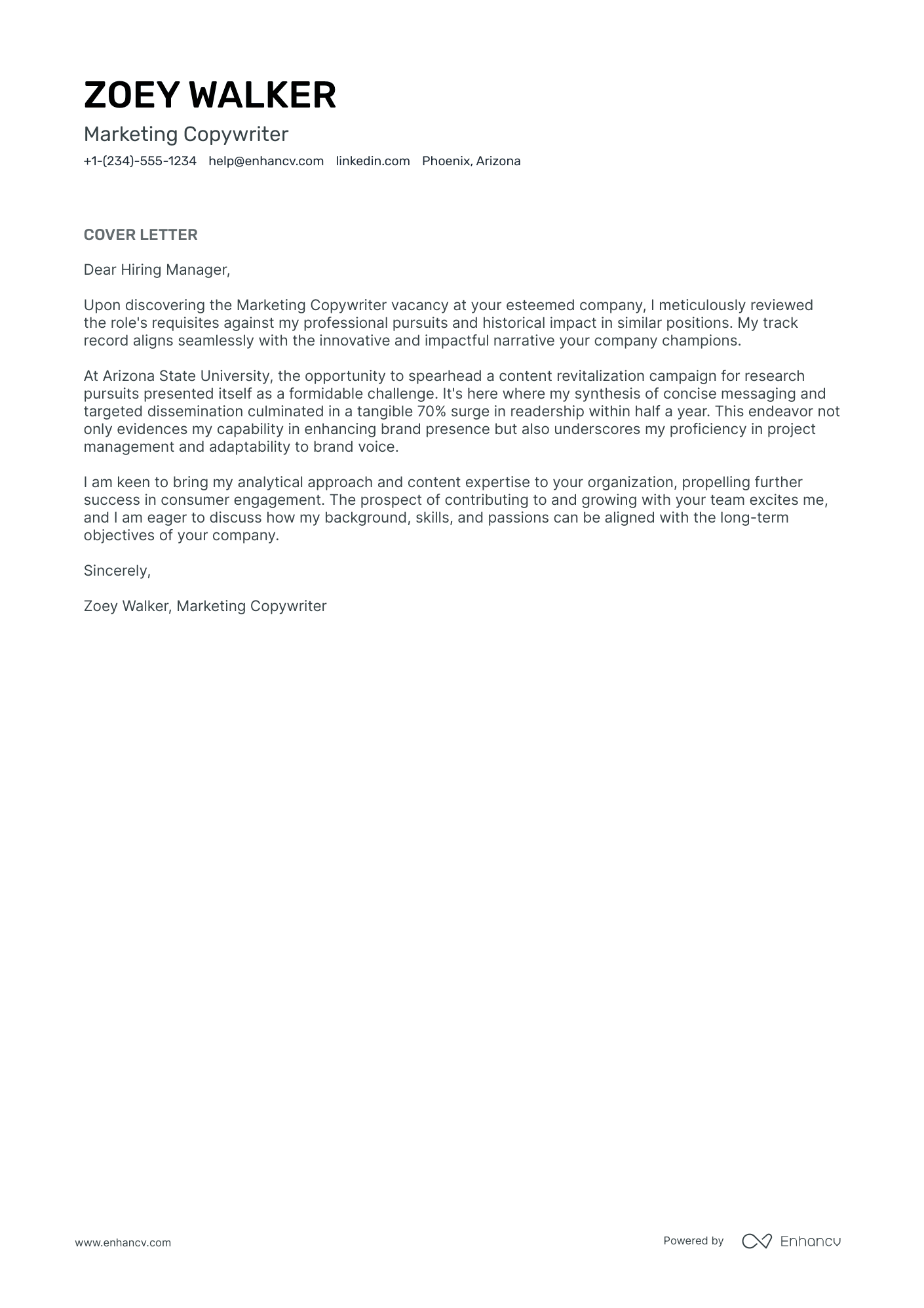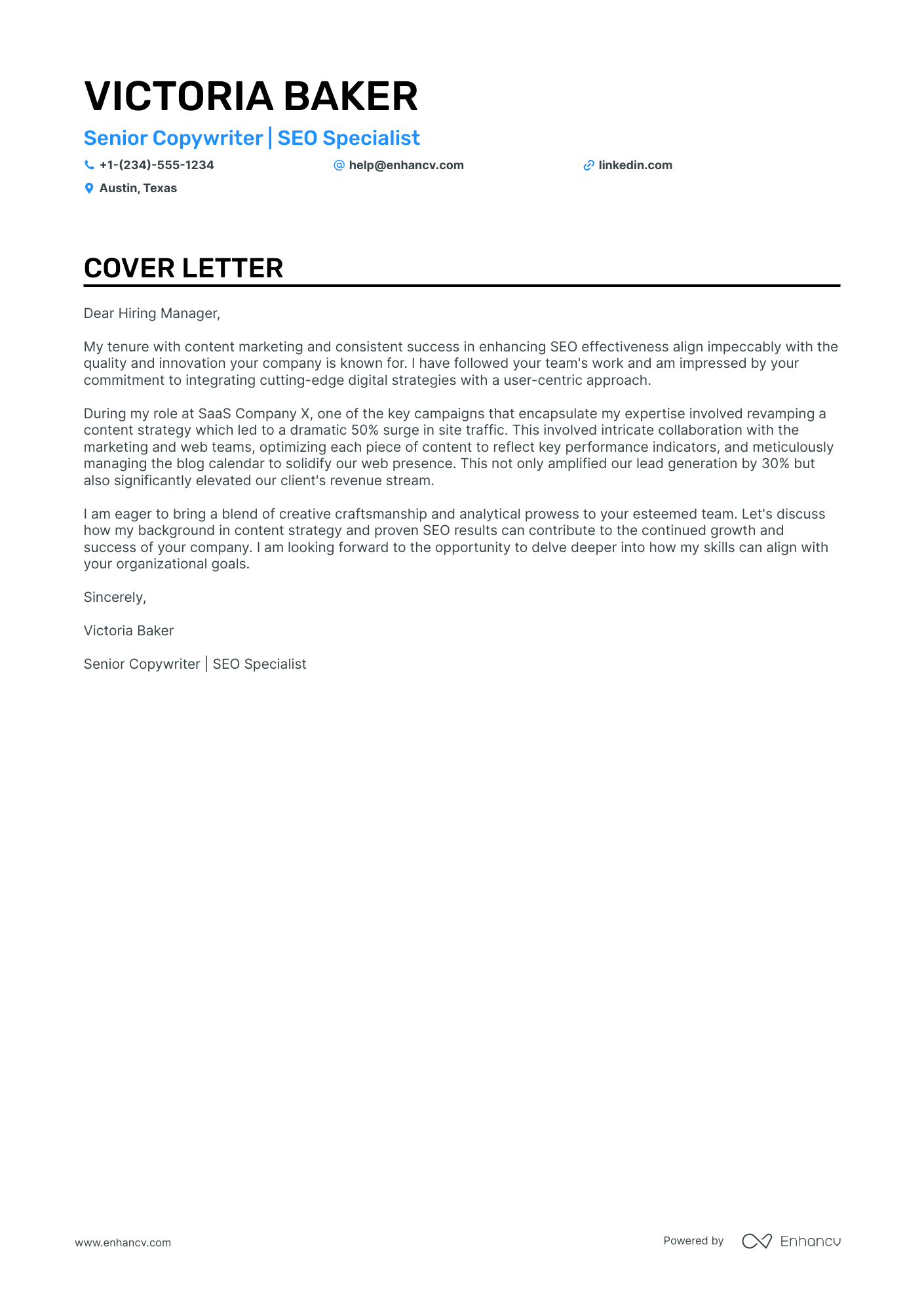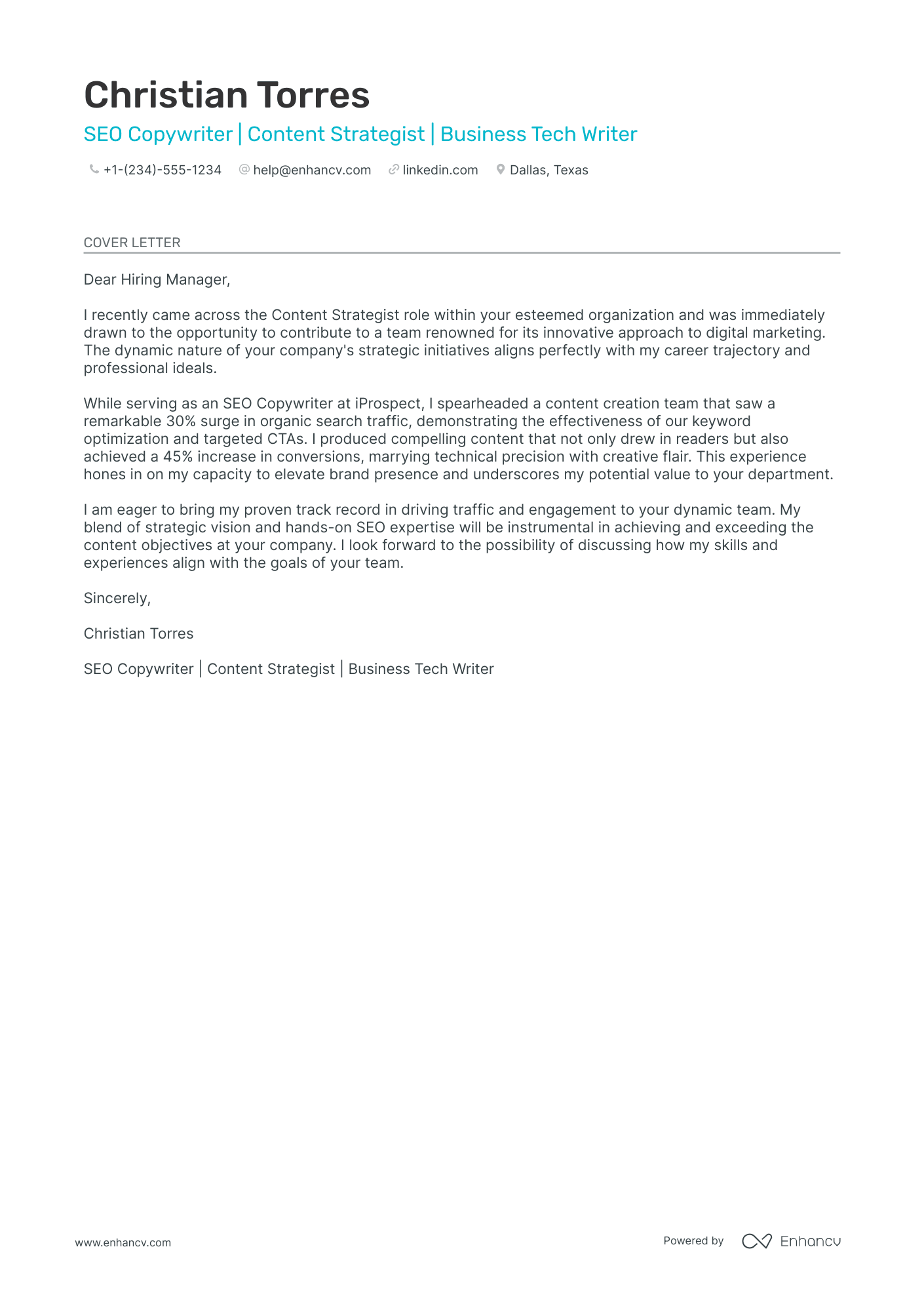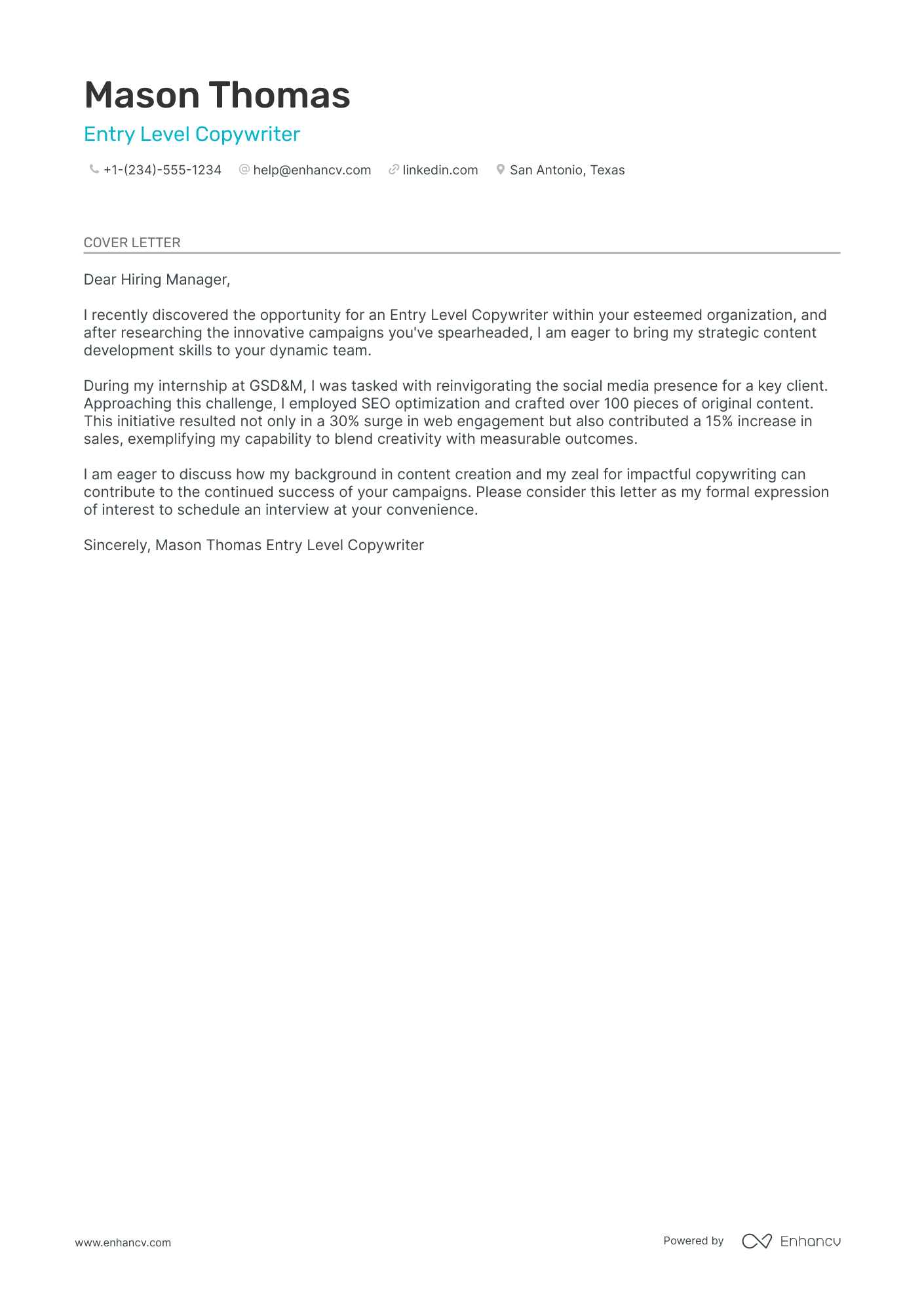Embarking on the job hunt, you've likely realized that alongside your polished resume, a compelling copywriter cover letter is essential. Crafting this one-page introduction shouldn't simply echo your resume; it must weave a compelling narrative around your crowning professional achievement. As you strive for formality without falling into the trap of clichés, remember, the goal is to engage the reader with authenticity and brevity. Let's unravel the process and pen a cover letter that resonates.
- Write a copywriter cover letter that helps you stand out (and get the job);
- Understand how to start and end your copywriter cover letter with the appropriate greeting;
- What to include in the body of your copywriter cover letter to put your best foot forward;
- Your most important achievements - how to present them as part of your copywriter cover letter.
And if you want to make your life even easier, simply drag and drop your copywriter resume into Enhancv's AI cover letter generator, and it will write your cover letter for you in just a few moments.
If the copywriter isn't exactly the one you're looking for we have a plethora of cover letter examples for jobs like this one:
Drop your resume here or choose a file.
PDF & DOCX only. Max 2MB file size.
Copywriter cover letter example
Jessica Brown
New York, NY
+1-(234)-555-1234
help@enhancv.com
- Highlighting relevant campaign success metrics and previous experience in a similar role (e.g., "120% boost in audience engagement" at a previous agency) demonstrates quantifiable achievements and expertise in the field.
- Drawing connections between one's personal professional journey and the company's approach (e.g., merging creativity with data-driven results) shows alignment with the company's values and working style.
- Expressing interest in leveraging specific skills for the role (e.g., copywriting prowess and digital marketing insights) directly relates the applicant's skill set to the requirements of the position being applied for.
- Requesting a meeting to discuss potential contributions to the team shows proactiveness and a readiness to engage further, indicating genuine interest in the company and the role.
Designing your copywriter cover letter: what is the best format
Let's start with the basics, your copywriter cover letter should include your:
- Header
- Greeting
- Introduction
- Body paragraph
- Closing statement
- Signature (that's not a must)
Next, we'll move to the spacing of your copywriter cover letter, and yes, it should be single-spaced (automatically formatted for you in our cover letter templates).
Don't go for a old-school font (e.g. Arial or Times New Roman), but instead, pick an ATS-favorite like Chivo, Volkhov, or Raleway, to stand out.
Our cover letter builder is also set up for you with the standard one-inch margin, all around the text.
Finally, ensure your copywriter resume and cover letter are in the same font and are submitted in PDF (to keep the formatting in place).
P.S. The Applicant Tracker System (or ATS) won't be assessing your [job] cover letter, it's solely for the recruiters' eyes.
Maximize your efficiency! With our free cover letter generator, you’ll have a great letter in moments.
The top sections on a copywriter cover letter
Header with Contact Information: Include your name, address, phone number, and email, providing the recruiter with immediate access to your contact details which is standard practice for any professional correspondence.
Personalized Greeting: Use the name of the hiring manager or recruiter if possible, as personalization can help establish a connection from the very beginning and shows attention to detail, a key skill for a copywriter.
Compelling Introduction: Start with a strong opening that hooks the reader’s attention, showcasing your creativity and writing skills, which are essential for a copywriter role.
Relevant Experience and Skills: Highlight your copywriting experience, knowledge of the industry, and specific writing skills, matching them to the job description to demonstrate that your qualifications align with the job requirements.
Call to Action and Formal Closing: End with an assertive call to action that invites further discussion, along with a polite and professional closing, maintaining the reader's interest and leaving a lasting impression of your enthusiasm for the role.
Key qualities recruiters search for in a candidate’s cover letter
- Creativity and Originality: To craft compelling and fresh content that stands out in a crowded market.
- Strong Writing and Editing Skills: To produce clear, grammatically correct, and engaging copy that resonates with the target audience.
- Understanding of Marketing and SEO: To align copy with brand strategy and optimize content for search engines, increasing visibility and engagement.
- Versatility in Writing Styles: To adapt tone and approach for various platforms and purposes, from social media to long-form articles.
- Ability to Work Under Pressure and Meet Deadlines: To handle multiple projects efficiently and deliver high-quality work within tight timeframes.
- Excellent Research Skills: To produce accurate and factually correct content that adds value to the reader and establishes the brand's credibility.
What matters most when tailoring your copywriter cover letter salutation
Your copywriter cover letter greeting should feel welcoming to recruiters.
Use their first name (e.g. "Dear Marshall" or "Dear Sara"), if you've previously been in touch with the hiring manager and are on a more friendly basis.
If this is the first time you're contacting the recruiters, start your copywriter cover letter with:
- their last name (e.g. "Dear Ms. Ali" or "Dear Mr. Stevens") - look up who's the hiring manager for the role on social media or the company website;
- generalized greeting (e.g. "Dear HR Team") - just don't use "To whom it may concern" or "Dear Sir/Madam".
List of salutations you can use
- Dear Hiring Manager,
- Dear [Company Name] Recruiting Team,
- Dear [Department] Team,
- Dear Mr./Ms. [Last Name],
- Dear Dr. [Last Name],
- Dear [Job Title] Hiring Committee,
What to include in those first two sentences, or your copywriter cover letter introduction
Have you ever wondered what the best way is to present your profile in the copywriter cover letter introduction?
There's no right or wrong answer if you're being concise and authentic to yourself.
Some professionals start their copywriter cover letter by:
- congratulating the company - focusing on something impressive, whether that's an award, an industry-leading project, or a key event;
- aligning their passion for the field or industry with the job - if you're enthusiastic about what you do, you'd thus grow your skill set and value as a professional.
How to write an achievement-focused copywriter cover letter body
We've got the intro and greeting covered. Now, comes the most definitive part of your copywriter cover letter - the body.
In the next three to six paragraphs, you'd have to answer why should recruiters hire you.
What better way to do this than by storytelling?
And, no, you don't need a "Once upon a time" or "I started from the bottom and made it to the top" career-climbing format to tell a compelling narrative.
Instead, select up to three most relevant skills for the job and look back on your resume.
Find an achievement, that you're proud of, which has taught you these three job-crucial skills.
Quantify your accomplishment, using metrics, and be succinct in the way you describe it.
The ultimate aim would be to show recruiters how this particular success has built up your experience to become an invaluable candidate.
Time to wrap up your copywriter cover letter
Writing the closing paragraph of your copywriter cover letter is just as important as the salutation.
You have to make it personalized to the job advert and recruiter.
Experienced professionals advise candidates to end with a request or reminder for follow-up. Write that you're grateful for the opportunity, and, at the same time, hint that you're available for the next steps of the process.
Otherwise, you could also conclude your copywriter cover letter by facing the future. How do you see yourself, as part of the team? In particular, how would you settle in your new role in the first six months to a year?
No experience copywriter cover letter: making the most out of your profile
Candidates who happen to have no professional experience use their copywriter cover letter to stand out.
Instead of focusing on a professional achievement, aim to quantify all the relevant, transferrable skills from your life experience.
Once again, the best practice to do so would be to select an accomplishment - from your whole career history.
Another option would be to plan out your career goals and objectives: how do you see yourself growing, as a professional, in the next five years, thanks to this opportunity?
Be precise and concise about your dreams, and align them with the company vision.
Key takeaways
Within this Enhancv guide, we've provided you with plenty of advice and inspiration on writing your copywriter cover letter:
- Always make sure your copywriter cover letter is tailored to the role you're applying for to make a good impression on recruiters;
- In your copywriter cover letter include a header (with your name, the role you're applying for, date, and contact details) and an introduction of up to two sentences that highlight your key accomplishment or why you'd fit the role;
- Focus your copywriter cover letter body on one sole achievement through your career and all the valuable lessons, skills, and know-how you've learned (that are relevant to the role);
- Ensure your copywriter cover letter closing statement isn't generic and includes either a call to action or a promise;
- If you lack professional experience, shift recruiters' focus to a relevant achievement (thanks to your academic or versatile experience) or toward your dreams and goals for professional growth.
Copywriter cover letter examples
By Experience
Entry Level Copywriter
Senior Copywriter
Junior Copywriter
By Role

